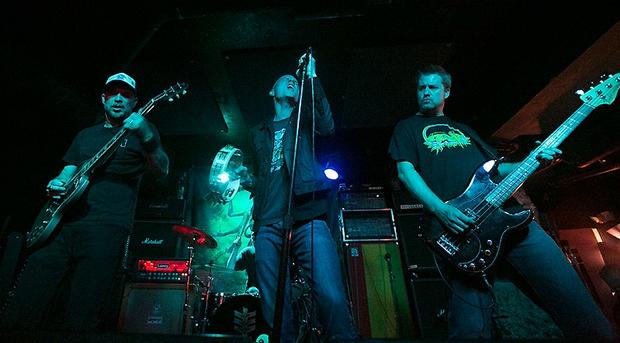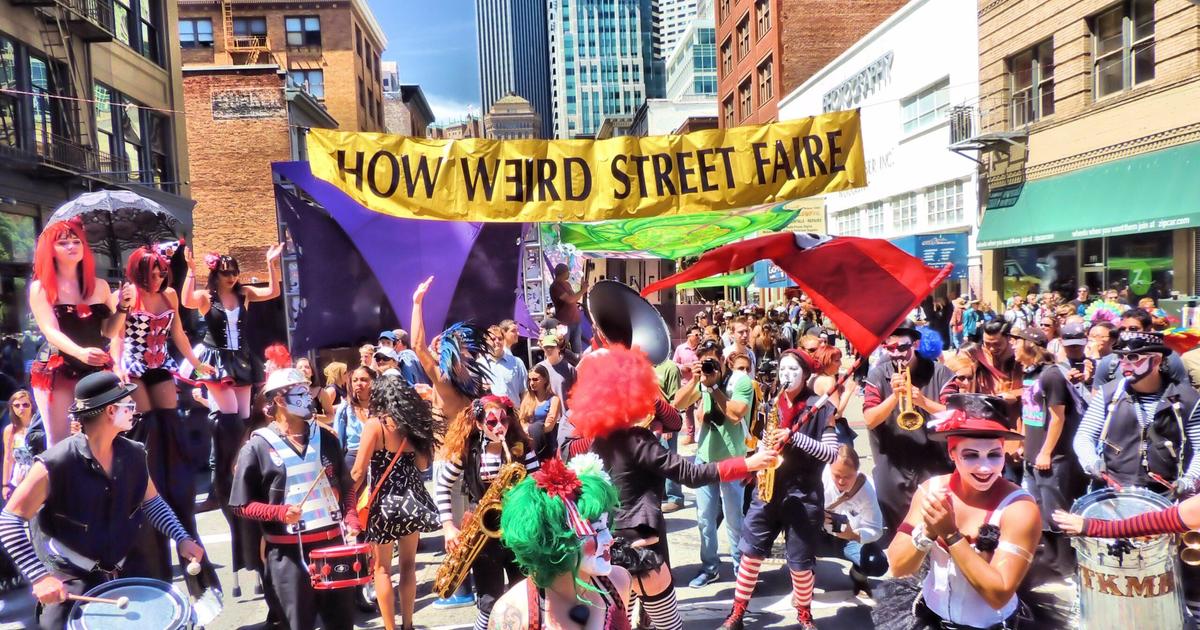CBS SF Talks To Blackwülf Guitarist Pete Holmes
By Dave Pehling
SAN FRANCISCO (CBS SF) -- One of the leading lights on the Bay Area metal scene, East Bay band Blackwülf has established a reputation for dishing out colossal riffs and memorable tunes over the course of six years and three acclaimed albums. Coming together around longtime collaborators guitarist Pete Holmes and drummer Dave Pankenier (who have played music together since they were growing up in Arizona), Blackwülf is rounded out by singer Alex Cunningham and bassist Scott Peterson.
Working from the classic quartet model that served so many great hard rock and metal bands during the '70s, Blackwülf crafted a handful of doom-laden originals for their self-released album Mind Traveler in 2014. While the group's sound owes an unquestionable debt to Black Sabbath, even on that debut effort Blackwülf stood apart from the many stoner-metal outfits who are content to pilfer riffs and song ideas wholesale from the iconic metal godfathers.
With Cunningham's commanding delivery and memorable vocal melodies at times recalling Scream/Wool/Goatsnake singer Pete Stahl and Holmes' hefty chord progressions and stinging, concise solos ably propelled by the group's hard-swinging rhythm section on "Royal Pine" and "Thunderwitch," the album quickly earned the band fan locally and abroad while catching the ear of Bay Area heavy rock imprint Ripple Music. The label would partner with Blackwülf to release the group's sophomore effort Oblivion Cycles late in 2015, earning another round of rave reviews, including the endorsement of Metallica drummer Lars Ulrich in a video posted on YouTube.
The East Bay headbangers took some time to get their next batch of songs together, but Blackwülf are set to put out their second sternum-rattling effort on Ripple Music entitled Sinister Sides on February 23. The anticipated album features guest appearances by legendary doom-metal guitarist Geof O'Keefe (a founding member of Pentagram and Bedemon) on several tunes and further refines the crew's heavy, psychedelic metal sound. CBS SF recently asked guitarist Pete Holmes a set of questions via email, learning about the veteran band's roots and the new recording ahead of the group's record release party at the Hemlock Tavern on Saturday, February 24, that will also feature O'Keefe joining Blackwülf onstage in addition to sets by like-minded Oakland metal band Mesmer and New Wave of British Heavy Metal tribute act Union Jack and the Rippers.
CBS SF: Blackwülf has been around since 2012, but you and Dave Pankenier have been playing together since you were in your teens. So you guys connected while you were growing up in Phoenix?
Pete Holmes: Someday, in the not so far distant future, a thesaurus will finally realize that a mandatory synonym for "rock" and "metal mayhem" is actually the proper noun "DAVE PANKENIER." Of course, they will inevitably need to offer one of those pronunciation guides for his last name. What a dude! As solid as they come, Dave's a triple threat: he can drum, sing, and write lyrics, but usually saves the singing and writing for his cool current other project bands -- Low Bote and Tsar Czar -- both awesome, SF-based art/new wave groups.
In Blackwülf, as in the three previous other bands that Dave and I have created over the years -- Pollo Elastico (with Oakland local Brad Brooks), Mountain Pig (with Neurosis sound man maestro Dave Clark) and The Nads (who recorded for Gearhead Records and Dollar Records Records) -- Dave has always been the consummate team player. He is a rock solid drummer and a great friend and I am super fortunate to play with him in Blackwülf.
CBS SF: Would you characterize the bands that you played in back then as being similar to Blackwülf as far as the style of music?
Pete Holmes: Everything that I have been involved with all shares a few basic characteristics: they're all rock bands, generally on the heavier and grittier side. Pollo Elastico was a metal funk band, Mountain Pig more of a stoner/grunge band and the Nads were a Detroit styled proto-punk band. Certainly, the fact that I was the guitarist in all three bands would tend to create some similarity of style to Blackwülf, but my feeling is that is about as far as it goes.
CBS SF: How long ago did you end up in the Bay Area?
Pete Holmes: I moved to San Francisco from Tucson in 1989 with my band Mountain Pig. We ended getting a band house flat on the Panhandle of Golden Gate Park and I worked at the Villains store on Haight Street. We rehearsed at Turk Street Studios in the 'Loin when that place was a complete war zone. Full on ultra violence in the streets on the way into the rehearsal rooms, just unreal. We were just a bunch of long haired cactus boys from the Sonoran Desert just wanting to play heavy rock and this urban madness was from another planet. We were one of the first bands in at Secret Studios when that place opened in the Mission, back when Caesar Chavez Street was called Army Street.
CBS SF: It sounds like you and Alex were friends for a while prior to starting the band. What spurred you to form Blackwülf together?
Pete Holmes: I met Alex through my wife, who was friends with his wife. He's a guy who played in a series of San Francisco bands that I never really was exposed to, most notably Jojo. I knew that Alex had serious vocal chops and could also play the guitar. We even had him in the Nads at the very end of that band. But I really wanted a one-guitar band with the classic focal point of a rock vocalist.
CBS SF: Did you take the band's name from the Marvel comic character?
Pete Holmes: Nope. In fact, we discovered the Marvel character after naming the band. And while the band wasn't named after the character, I was far more familiar with the Blackwolf from Ralph Bakshi's animated movie Wizards.
CBS SF: You took a little longer getting this album together compared to the time between Mind Traveler and Oblivion Cycle. Did you plan to spend more time on the songwriting or was that just how things turned out?
Pete Holmes: We knew that it was going to be very tough to follow Oblivion Cycle. That release was just so chock full o' riffs! Everything was so in your face and aggressive. We were like, "Where do we go from here? What are we gonna do? How can we make a record that isn't exactly the same as the one we created previously?" We consciously spent time pondering how we could take the next steps into the kind of light and shade/fast and slow type of material that we envisioned, and began writing in that manner. We all knew that it would be a risk making Sinister Sides in this way, but consciously went for it.
We articulated it to each other like, "Let's make a record the way it was done in the old days, with old gear, the two-inch analog tape, and unapologetically diverse in content. Let's write songs, not sounds." It was going to test both our own musical depth and the depth of our listeners, fans who loved the band for Oblivion Cycle. The end result was a blend of all the things that authentically comprised the band: heavy riffs, melodic songs and darker psychedelic jams that organically felt like they belonged together.
CBS SF: "Gate of Sorrow" opens the album on a slower, more deliberate pace before the tempo kicks up in the last part of the song. Did the sequencing of the songs for the record come pretty easily?
Pete Holmes: We actually recorded the album in sections, which gave us the luxury of determining what we had as far as sequencing as we developed the album. With "Gate of Sorrow," it's a song that came later and it was the opener that we were looking for. It has a slow and dark plodding fuzz-wah bass line that Scott Peterson brought in, which felt like an ideal way to get the album slowly moving forward, to bring the listener in and build a slow tension. The uptempo riff at the end of the tune was actually bolted onto the song from a thing that we had been jamming on in the rehearsal space. It worked out with a kind of Hellacopters/Thin Lizzy feel, I think.
CBS SF: "Waiting on Tomorrow" is the first straight ballad I can recall from the band. How did that tune come together?
Pete Holmes: That song, for me, was one of the most fun to record on the album. On Oblivion Cycle, we had the acoustic and flute number "Dark Tower;" we knew that we wanted to explore the acoustic stuff a little more on Sinister Sides, hence the track "Waiting on Tomorrow." I was experimenting with some acoustic tunings that Neil Young used on "Don't Let it Bring You Down," one of my favorite Neil songs. Just breathtaking.
So I created some chord changes around the tuning on my 12-string Martin and the song took shape. I then brought it to Alex and we talked about a "story song" which we wanted to with it. We parted and wrote separate lyrics to the song and then came back and made one song out of the two lyric sets. Once in the studio, we started building it up slowly and leanly, adding some deep Fender Twin reverb and Tremolo on chords played through a Fender Jazzmaster and then a lead with a Gibson ES335. The tones and vocal performance on that track are very near and dear for me. I'll never forget putting that song together in the studio with Alex.
CBS SF: You've talked about how "Dead to the World" and the whole album is more explicitly political as far as addressing the current leadership problem the country finds itself in. Did you feel like the situation demanded addressing? Any concerns about fan reaction given that metal doesn't always attract the most liberal of audiences?
Pete Holmes: No concerns at all. I do sometimes see some metal audiences embracing more right-wing causes and philosophies. Hey, it's a free country. Metal is a diverse community, with all kinds of opinions, and that's all good. We're not consciously trying to radicalize our fans or anyone. We're just using metaphor and allegory to illustrate the sad truths that we observe on a daily basis from what we would mildly term "a s---ty administration."
This is a group that is so hypocritical and inefficient that their own people are jumping ship constantly; obviously a very dangerous and idiotic situation that a massive amount of people in our democracy are concerned about. They've ripped off this country, and Congress itself is too flaccid, spineless and apathetic to do anything about it. So yes: we did feel like the situation demanded addressing. Art and music can sometimes function as the proverbial "canary in the coal mine."
CBS SF: How did you end up having Geof O'Keefe from Pentagram and Bedemon guest on the album?
Pete Holmes: It really started down at the Psycho California festival a few years ago, when Geof had Bedemon gigging there. I met a friend of his while waiting to speak with Geof, and passed along some of our music to her. Low and behold and out of the blue, six months later, I get an e-mail from Geof himself, who tells me that he digs the band and wants to get some copies of albums.
The best part of it was that he wanted to trade me Pentagram releases for Blackwülf releases! I definitely got the best side of that deal! Anyway, we stay in touch, and a friendship develops between us, so it felt really natural to invite him up to South San Francisco to add some of his incredible guitar wizardry to our album when we began the recording. He's a really great person, a gifted guitarist and drummer, and we're greatly honored to have him on the new release.
CBS SF: So did you bring him out to SF to record in the studio versus having him track his solos and sending them to you online?
Pete Holmes: We brought him up for a recording session. He drove up, set up his gear and laid down some killer tracks. We did it old school, and all hung out with him during the session and had a killer time together. He was completely rehearsed and was a pleasure to work with.
CBS SF: Did you get demos of the two original songs to him prior to the sessions? Did you have time to run through the tunes with him in the studio or were you more focusing on getting his parts recorded?
Pete Holmes: We sent demos of all three of the tracks to him via CD for him to work with before his trip up to us. He dubbed his parts over our completed rhythm tracks during our session in South City, and even added a couple of gong hits on the title track. Like I said, we basically just had a blast, and all collectively kinda felt like we were there to make the tracks sound the best that they could.
CBS SF: How did you decide to doom up "Sunshine of Your Love" for this album? Were there any other covers under consideration?
Pete Holmes: You can't go wrong with Cream. Even on such an iconic and very popular song like "Sunshine of Your Love," the heavy blues power of that band is so compelling. "Sunshine" is a tune that's in every guitarist's trick bag. One night at rehearsal, we decided it to air it out and do it our way, and liked what we heard. I like to think that the tune connects us to some of Blackwülf's classic heavy-rock roots. We have a video shot by Scott Hester is out now. At this point, no other cover songs are really planned, but anything can happen, right?
CBS SF: Is Geoff just sitting on on those songs live, or are you working him into more of your set?
Pete Holmes: Geof is just sitting in on the three songs that he recorded with us. We like the "special guest" aspect of his involvement that way.
CBS SF: This is your third album recorded at Trakworx with Justin Weis. Is he producing or just engineering? What about the experience keeps you coming back?
Pete Holmes: Justin Weis is amazing. His insights from tracking to mastering are first rate, and his rock and metal instincts are spot on. While much of the album features Justin's creative input, Blackwülf ultimately produced the record. All final decisions and vision are always on the band. Justin engineered and mastered all of the sessions, and provided huge input and expertise, and helped us to manifest what we had in our evil minds. Collectively, we made this thing happen.
CBS SF: I know you've played some U.S. festivals, but is Desertfest in London going to be your first international festival? Have you toured the U.K. and Europe before?
Pete Holmes: Personally, this will be my first time across the pond with a band. Dave did like 42 dates there last year with NYC band White Hills. I am really stoked to be getting over there and ripping in Camden, London, and especially on such a respected festival program. We are playing at the Black Heart on May 6.
CBS SF: In the past you've had the album covers drawn by artists like Alan Forbes. How did you end up going with the more computer generated art on Sinister Sides?
Pete Holmes: Blackwülf has always liked to work with original artists for our design stuff, but this sometimes can be easier said than done. For starters, we are impossible to work with when it comes to visual art; we all have strong opinions about what we ultimately want as far as images to represent our music. So that drives people crazy! For Sinister Sides, we found a very easy fit with San Francisco's North Beach photographer/artist Ruby Ray.
Ruby is a legend in her own right, having photo documented a huge part of the 70s and 80s punk rock scene in San Francisco, London, and New York. Her collection is phenomenal. Ruby is now doing computer fractal imagery work, which blew us away. We used one of her designs which she allowed us to manipulate for our cover of the album and the gatefold as well. It's really intense and heavy imagery; something you can kind of trip out on and stare at for a while. I like to think that her modern take on something heavy and trippy is a visual metaphor for the music inside: something old made new again.





